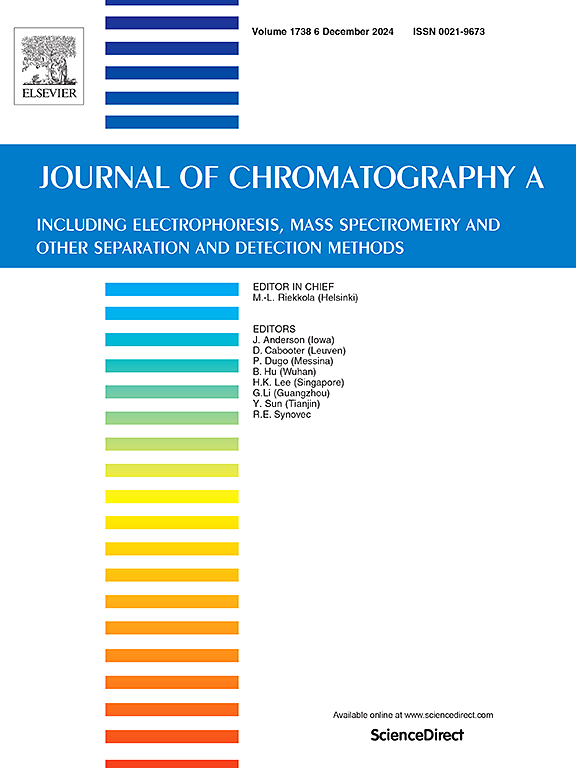Exploring the utility of complementary separations in liquid chromatography
IF 3.8
2区 化学
Q1 BIOCHEMICAL RESEARCH METHODS
引用次数: 0
Abstract
An alternative strategy is explored for the separation of samples by liquid chromatography (LC). Unlike traditional approaches that aim to resolve all components in a given sample within a single LC separation, the proposed strategy uses two or more distinct separations carried out with a different gradient program and/or using different separation chemistries i.e., a different set of mobile and stationary phase. This set of complementary incomplete separations (CIS) is selected such that each component is at least fully resolved once, meaning the most critical pairs of each individual separation can be left unseparated. This allows for a significant time saving per separation. To investigate whether such an approach can lead to overall shorter analysis times than is possible with the fastest single-run gradient separation, a comprehensive in silico study covering a statistically significant number of samples is undertaken. The investigation shows that, for the presently considered sample sets and chemistries, CIS has a substantially higher probability, about two times greater for the simplest samples considered in this work and as much as 30 times greater for more complex samples, to fully resolve an unknown sample compared to a single gradient separation. Comparing separation speeds, the CIS approach can achieve complete sample resolution on average approximately four times faster than a single separation. Our findings thus demonstrate the potential of CIS in enhancing separation efficiency and offer insights regarding their use for solving analytical challenges.
探索液相色谱中互补分离的实用性。
本文探讨了液相色谱法(LC)分离样品的另一种策略。传统方法的目的是在一次液相色谱分离中分辨出给定样品中的所有成分,与之不同的是,建议的策略采用两种或更多种不同的分离方法,使用不同的梯度程序和/或不同的分离化学试剂,即不同的流动相和固定相。在选择这组互补不完全分离(CIS)时,每个组分至少要完全分离一次,这意味着每个单独分离中最关键的对可以不分离。这样可以大大节省每次分离的时间。为了研究这种方法是否能比最快的单次梯度分离缩短总体分析时间,我们进行了一项涵盖大量统计样本的全面硅学研究。研究结果表明,就目前考虑的样品集和化学成分而言,与单次梯度分离相比,CIS 完全解析未知样品的概率要高得多,对于本研究中考虑的最简单样品而言,CIS 的概率大约是单次梯度分离的 2 倍,而对于更复杂的样品,CIS 的概率则高达 30 倍。比较分离速度,CIS 方法实现完全样品解析的平均速度约为单一分离的四倍。因此,我们的研究结果证明了 CIS 在提高分离效率方面的潜力,并为利用 CIS 解决分析难题提供了启示。
本文章由计算机程序翻译,如有差异,请以英文原文为准。
求助全文
约1分钟内获得全文
求助全文
来源期刊

Journal of Chromatography A
化学-分析化学
CiteScore
7.90
自引率
14.60%
发文量
742
审稿时长
45 days
期刊介绍:
The Journal of Chromatography A provides a forum for the publication of original research and critical reviews on all aspects of fundamental and applied separation science. The scope of the journal includes chromatography and related techniques, electromigration techniques (e.g. electrophoresis, electrochromatography), hyphenated and other multi-dimensional techniques, sample preparation, and detection methods such as mass spectrometry. Contributions consist mainly of research papers dealing with the theory of separation methods, instrumental developments and analytical and preparative applications of general interest.
 求助内容:
求助内容: 应助结果提醒方式:
应助结果提醒方式:


